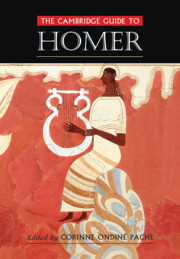Book contents
- The Cambridge Guide to Homer
- The Cambridge Guide to Homer
- Copyright page
- Contents
- Figures
- Notes on the Contributors
- General Introduction
- Part I Homeric Song and Text
- Part II Homeric World
- Part III Homer in the World
- Introduction
- Homer in Antiquity
- Homer and the Latin West in the Middle Ages
- Homer in Greece from the End of Antiquity 1: The Byzantine Reception of Homer and His Export to Other Cultures
- Homer in Greece from the End of Antiquity 2: Homer after Byzantium, from the Early Ottoman Period to the Age of Nationalisms
- Homer in Renaissance Europe (1488‒1649)
- Homer in Early Modern Europe
- The Reception of Homer since 1900
- Introduction by Thomas E. Jenkins
- Homer and War since 1900 by Peter Meineck
- Gendered Reception of Homer by Lillian Doherty
- Homer in Social Thought by Thomas E. Jenkins
- Homer in Greece: The Inevitable and Impossible Nostos by George Syrimis
- Postcolonial Perceptions of Homeric Epic by Emily Greenwood
- Homer and Homerica on Screen by Martin M. Winkler
- From the Cinema to Beyond: Homer in Comics, Television, Apps, and New Media by Thomas E. Jenkins
- Homer in Twentieth (and Twenty-First) Century Scholarship by Alexander Beecroft
- Homer: Image and Cult
- Key Topics
- Bibliography
- Index
- References
Gendered Reception of Homer by Lillian Doherty
from The Reception of Homer since 1900
Published online by Cambridge University Press: 22 February 2020
- The Cambridge Guide to Homer
- The Cambridge Guide to Homer
- Copyright page
- Contents
- Figures
- Notes on the Contributors
- General Introduction
- Part I Homeric Song and Text
- Part II Homeric World
- Part III Homer in the World
- Introduction
- Homer in Antiquity
- Homer and the Latin West in the Middle Ages
- Homer in Greece from the End of Antiquity 1: The Byzantine Reception of Homer and His Export to Other Cultures
- Homer in Greece from the End of Antiquity 2: Homer after Byzantium, from the Early Ottoman Period to the Age of Nationalisms
- Homer in Renaissance Europe (1488‒1649)
- Homer in Early Modern Europe
- The Reception of Homer since 1900
- Introduction by Thomas E. Jenkins
- Homer and War since 1900 by Peter Meineck
- Gendered Reception of Homer by Lillian Doherty
- Homer in Social Thought by Thomas E. Jenkins
- Homer in Greece: The Inevitable and Impossible Nostos by George Syrimis
- Postcolonial Perceptions of Homeric Epic by Emily Greenwood
- Homer and Homerica on Screen by Martin M. Winkler
- From the Cinema to Beyond: Homer in Comics, Television, Apps, and New Media by Thomas E. Jenkins
- Homer in Twentieth (and Twenty-First) Century Scholarship by Alexander Beecroft
- Homer: Image and Cult
- Key Topics
- Bibliography
- Index
- References
Summary
Selected poems by H. D. (Hilda Doolittle), Margaret Atwood, Louise Glück, and Jorie Graham are discussed as examples of Homeric reception by modern women poets, who give voice to some of Homer’s female characters ‒ Helen, Circe, Penelope ‒ in exploration or implicit critique of traditional gender roles but also in affirmation of the artistic authority of the woman poet.
- Type
- Chapter
- Information
- The Cambridge Guide to Homer , pp. 523 - 525Publisher: Cambridge University PressPrint publication year: 2020

